 Petzlover
Petzlover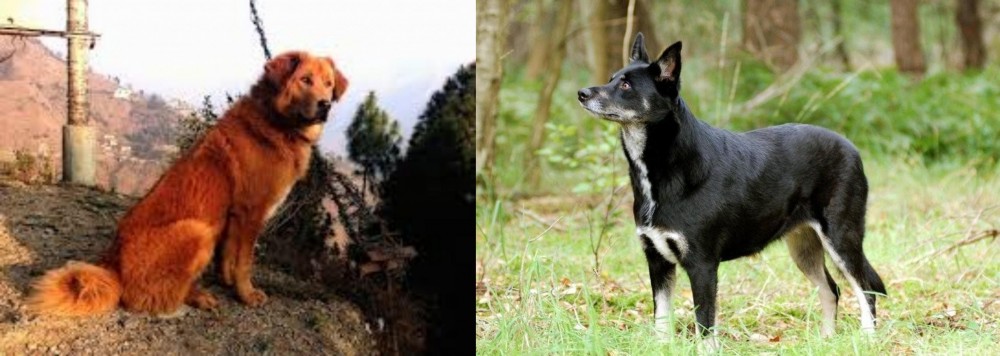 Himalayan Sheepdog is originated from India but Lapponian Herder is originated from Finland. Himalayan Sheepdog may grow 20 cm / 8 inches higher than Lapponian Herder. Himalayan Sheepdog may weigh 10 kg / 23 pounds more than Lapponian Herder. Both Himalayan Sheepdog and Lapponian Herder has same life span. Both Himalayan Sheepdog and Lapponian Herder has almost same litter size. Himalayan Sheepdog requires High Maintenance. But Lapponian Herder requires Moderate Maintenance
Himalayan Sheepdog is originated from India but Lapponian Herder is originated from Finland. Himalayan Sheepdog may grow 20 cm / 8 inches higher than Lapponian Herder. Himalayan Sheepdog may weigh 10 kg / 23 pounds more than Lapponian Herder. Both Himalayan Sheepdog and Lapponian Herder has same life span. Both Himalayan Sheepdog and Lapponian Herder has almost same litter size. Himalayan Sheepdog requires High Maintenance. But Lapponian Herder requires Moderate Maintenance
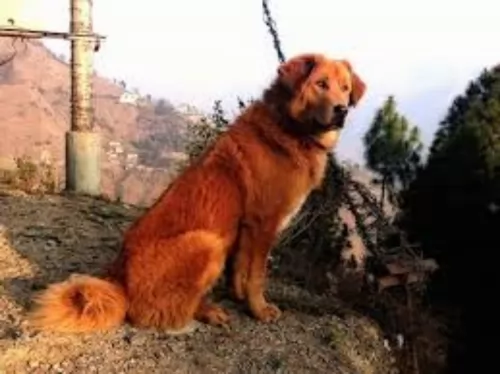 The Himalayan Sheepdog comes from Nepal originally and was bred as a guardian for livestock. The exact location where the breed comes from is not documented well but it is thought that they come from North India and Nepal and they are rare outside of that area. They are a mountain dog – close in ancestry to the Himalayan Mastiff, and the Kinnaur Sheepdog of Tibet (Himalaya). All these Himalayan mountain dogs were all called “Gaddi dogs”. The term was used for all the large dogs no matter what their breeds actually were.
The Himalayan Sheepdog comes from Nepal originally and was bred as a guardian for livestock. The exact location where the breed comes from is not documented well but it is thought that they come from North India and Nepal and they are rare outside of that area. They are a mountain dog – close in ancestry to the Himalayan Mastiff, and the Kinnaur Sheepdog of Tibet (Himalaya). All these Himalayan mountain dogs were all called “Gaddi dogs”. The term was used for all the large dogs no matter what their breeds actually were.
The Himalayan Sheepdog is called by various names depending on where they were from. They are called Gaddi Leopardhund in Himachai Pradesh, In Nepal they are known as Bhote Kukkur or Bhotiya. Then there are Chamba Gaddi dogs. They are an ancient breed that existed before documentation on breeds was kept.
They acted as both guardians and herders. They guarded the mountain men’s encampments as well as the livestock. They were also used at times to hunt large animals. Today they are found only within Nepal and India. These Himalayan Sheepdogs are on the verge of extinction in India. There are no breeding programs and their isolation has caused the dilution of the gene pool. It is not recognized by any clubs including the UKC and the AKC.
 The Lapponian Herder hails from Finland. He is a dog which was developed for the Sami people who needed a strong dog to herd and guard their reindeer. The Sami people knew that they could reply on these Spitz-type dogs to efficiently manage their reindeer herds.
The Lapponian Herder hails from Finland. He is a dog which was developed for the Sami people who needed a strong dog to herd and guard their reindeer. The Sami people knew that they could reply on these Spitz-type dogs to efficiently manage their reindeer herds.
As with many other dog breeds, their numbers dwindled during and after the Second World War, and breeders then stepped forward to restore the herding dog populations. The dog was developed from Spitz-type herding breeds which were crossed with black and white Karelian Bear Dogs as well as other dog varieties.
Both the Lapponian Herder and the Finnish Lapphund were recognized as the same breed, with the Lapponian being separated into its own breed in 1966.
The dog is one of Finland’s five national dog breeds and in 2017, the Lapponian Herder was accepted to the Foundation Stock Service program.
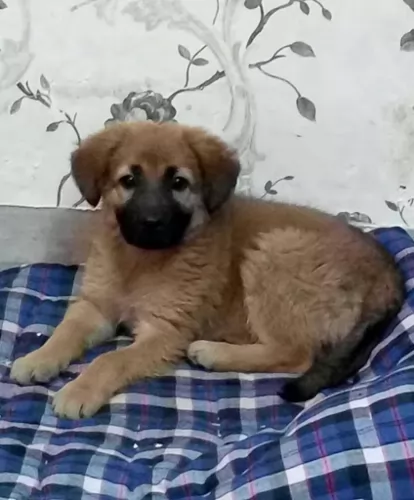 The breed is a large dog, very athletic and strong. The Himalayan Sheepdog is muscular with a deep chest, strong neck and strong shoulders. It has a medium tail that is thick and busy, curled high over its back. It is a daunting dog that can be very intimidating. They have well padded and large paws. With a broad head and wide forehead, they have a strong, wide muzzle. Their ears are high on the head and hang from the sides. They have almond shaped medium eyes that are deep set with a black nose.
The breed is a large dog, very athletic and strong. The Himalayan Sheepdog is muscular with a deep chest, strong neck and strong shoulders. It has a medium tail that is thick and busy, curled high over its back. It is a daunting dog that can be very intimidating. They have well padded and large paws. With a broad head and wide forehead, they have a strong, wide muzzle. Their ears are high on the head and hang from the sides. They have almond shaped medium eyes that are deep set with a black nose.
They are a very active and swift dogs. By their nature they are constantly in motion, patrolling their territory and guarding their flock and people. Their devotion to their people and their courage is the stuff of legends. Their coat is double with a large ruff around their necks that resembles a mane. The inner coat is dense and short while the outer coat is longer but dense as well.
 This is a medium sized dog and both male and female dogs stand between 43 and 51cm in height and weigh in the region of 30 to 35kg.
This is a medium sized dog and both male and female dogs stand between 43 and 51cm in height and weigh in the region of 30 to 35kg.
They have a medium length double coat which is straight and fairly harsh to the touch. They are moderate shedders.
Looking much like a combination German Shepherd and Wolf, the Lapponian Herder’s coat can be dark grey, cream, dark brown and black. He has erect ears, brown eyes and a long bushy tail which can be held low but which he raises somewhat over the back when he is alert. The head is wedge-shaped with tapering muzzle and black nose.
Energetic and lively while also being calm, the Lapponian Herder makes an excellent family pet.
As a very active breed, he is going to need an active, outdoor-type of owner. He is an intelligent, independent dog who wants to be kept busy. Because of his smartness he is easy to train ad socialize, being a dog that wants to please.
Training and socialization will do wonders for him, particularly because he is a vocal dog, loving to bark and air his views. With the training you can call out to him ‘be quiet’ and he will, as he becomes an obedient dog who is a pleasure to have around in all kinds of situations.
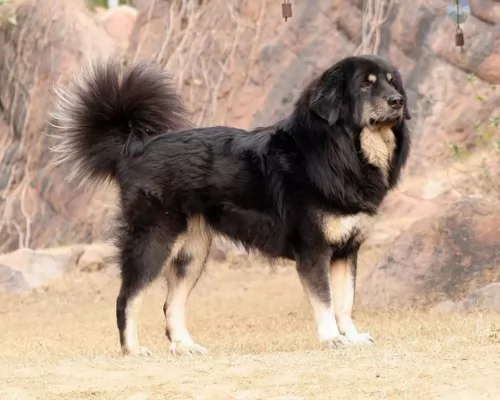 Yes with enough proper socialization
Yes with enough proper socialization
Protection and loyalty
They are not especially adaptable and need a large yard. They are not good in an apartment.
Intelligent but stubborn and independent making them able to learn if they want to.
 The Lapponian Herder is a great family pet who is social and who loves being in the company of his human family, being able to get on well with children in the home too, as well as pets.
The Lapponian Herder is a great family pet who is social and who loves being in the company of his human family, being able to get on well with children in the home too, as well as pets.
He plays a protective role too, not being quiet when it comes to barking and warning his family of intruders.
They’re very energetic dogs but can be docile indoors. He is smart too, being able to learn quickly. Bring one of these Lapponian Herders into your home, and you’re guaranteed a splendid family pet.
 This is a pretty healthy breed with very few health issues. They have the usual large dog issues.
This is a pretty healthy breed with very few health issues. They have the usual large dog issues.
 The Lapponian Herder, with good care, should be able to live for 10 to 14 years.
The Lapponian Herder, with good care, should be able to live for 10 to 14 years.
He is generally believed to be a healthy dog breed, but as with most other dogs, there are a few health issues which can crop up. These can be eye- and infections as well as skin allergies. These can be highly irritating for your dog and painful too, and veterinary intervention may be required.
Other serious dog problems can be bloat and joint dysplasia.
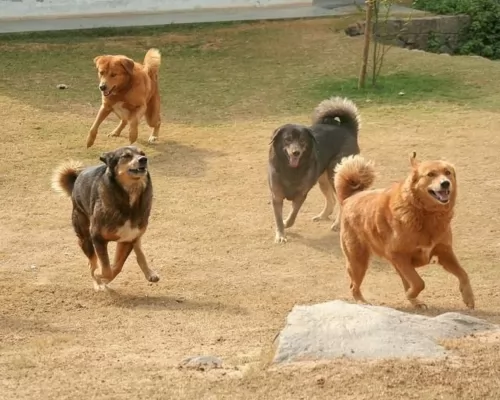 Feed the puppy 2-3 times a day with a total of two cups of a quality dog food for large breed dogs.
Feed the puppy 2-3 times a day with a total of two cups of a quality dog food for large breed dogs.
Feed the adult dog twice a day with 3 to 4 cups of a high quality dry dog food for large breed dogs.
They are very strong and athletic.
The Himalayan Sheepdog needs exercise but not to be overworked. They should be taken on long walks at least once a day. They might play fetch or run in a yard, but they don’t like too much exercise.
 The Lapponian Herder has a dense coat and he is considered to be an average shedder with some seasonal shedding.
The Lapponian Herder has a dense coat and he is considered to be an average shedder with some seasonal shedding.
To keep the coat sleek and shiny, get into the habit of brushing him twice a week. With the assistance of the right grooming tools you will be able to clip his nails if he doesn’t wear them down naturally. Just be careful though, because cutting to far down can mean cutting him where the nerves are and this can cause your pet great pain.
When you brush him, check his ears at the same time and use a damp cloth to wipe away the excess wax and dirt.
His teeth should also be cleaned with canine toothpaste and toothbrush. If you are apprehensive about keeping up with these grooming procedures, there are professional dog grooming experts who will attend to your dog’s grooming needs.
The Lapponian Herder is a medium sized dog full of energy.
If you feed him commercially manufactured kibble, you’ll read on the packaging about the type of food it is and what portion sizes to give him. Always go for the top quality brands that are made with good meaty ingredients and not filled with the likes of colorants and preservatives.
It is healthier to give him 2 smaller meals a day as opposed to one large meal. Try and give him some home-cooked food to bring in some variety. Excellent food for him would be some cooked chicken, brown rice, pasta and some cooked or raw vegetables added into his kibble. Every now and then it can be good for him to have a bit of raw meat added into his food.
Your Lapponian Herder must have constant access to cool, fresh water. Remember to wash the bowl out regularly, as the dog’s saliva enters the water when drinking.